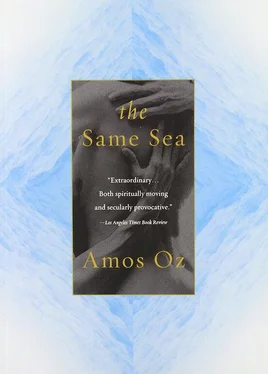feast on your flesh relishing you all bit by bit
yes rip it gouge it yes tear its eyes out so shout
its crouching to dismember you liver pancreas and kidney
seeping into your spleen tearing you creeping from ovary
to gut sucking and chewing at your diaphragm
planting venomous fangs into lung and palate fight it
my chewed mother get it by the throat dont let it
Mother slain lamb shout.
It's a little less hot today which is why I asked him to come and sit with me on the veranda from where we can see the garden and breathe the nearby sea. This summer is already trailing signs of tiredness but it is still cruel and changeable, a capricious old tyrant. I put two liter bottles of mineral water on the table, remembering from last time how insatiably thirsty he is. The tax file he brought with him seems, at first glance, not entirely above board, it is sloppy and may have cut a few corners. Dombrov is a small company producing mainly advertisements and short public information films, the risk of fires in summer, the importance of wearing a seat belt. I'll go over it for him. Put it straight. It's a matter of two or three hours' work. And in the meantime the sea breeze comes and goes. On the garden seat below us a black cat lay dozing. Once again he talked about chance and guiding hands, like the first morning. It was not chance, in his view, that brought Dita and him together. Would it seem absurd if he confided in me that her script exactly describes his life and even his most intimate fantasy? A quiet house in a village, adjacent to a cemetery, with a tiled roof and thirty or forty fruit trees, a dovecote and a beehive, all surrounded with a stone wall and shaded by tall cypresses, and a young woman, Nirit, who because of a moment of compassion or some other fleeting emotion comes to stay for a few days, despite the fact that women usually find him repulsive. That is her script in a nutshell and it exactly represents the fantasy that has haunted him for many years, and that he has never told to another man or woman. It's a fact. Is it really possible, Mr. Danon, that it's just coincidence? How on earth did she manage to write a stranger's innermost dream? And another mysterious thing, how do you explain that she brought this script to me of all people? Half the inhabitants of Tel Aviv are producers. Or think they are. Do you really believe, Mr. Danon, that it's all just coincidence?
To this, naturally, I neither had nor could have an answer one way or the other — who can say — however I was surprised that this time, unlike his previous visit, he did not touch the glass of water I had poured him, which fountained bubbles excitedly till it grew tired, and subsided. As though in the meantime he had undergone a thorough detox. Instead, while he was expounding his views on probability, he attacked the fruit I had put in front of him, pears, grapes, apples, and devoured it without noticing what he was doing, munching, dripping, unaware that he was staining his clothes, what is just chance, Mr. Danon, and what is the result of the guiding hand of fate? I was astonished that he attributed some kind of decisive authority to me of all people. If we had lived lets say a couple of hundred years ago you might have imagined that he had come to me to ask for her hand in marriage and meanwhile here he was beating about the bush.
It's not easy to know, I said, whether there is such a thing as a guiding hand, and it's even harder to explain towards what and to what purpose this hand, if it exists, is or is not guiding what appears to us as chance. I sometimes wonder myself. To be sure what I said did not contain any answer, but somehow he seemed satisfied, even happy: on hearing the words "I sometimes wonder myself" his greedy mole's face suddenly lit up, and for an instant through this expression I caught a glimpse of a sad, unloved child, whose father has suddenly given him an unexplained pat on the back, that he has interpreted as a caress. Before I had any notion where or why, my hand reached out, touched him lightly on the shoulder as I saw him to the door, and "Don't worry," I said, but why did I say it, "we'll check through your tax papers and maybe straighten them out a bit, get in touch next week and don't even mention money."
It drips. It stops. It trickles.
The water tastes like wine.
A sluggish little fountain
in the courtyard of the shrine.
We've reached Ladakh, the "country
of the children of the moon,"
along the River Chandar,
and a lake named Chandartal.
The village is called Tiksa,
Tiksa Gumpa is the shrine,
the woman's name, Maria: you're
the one that she recalls.
The one who kissed her feet.
Yes, I mean you: come here.
Did you know there is a custom
in the region of Ladakh
to give one bride in marriage
to two or three young men,
to two or three young brothers.
It's you that she recalls.
The fountain flows and falters,
it stops and starts again
in the courtyard of the shrine.
The stone here is not chiselled,
but plastered white and red.
The shrine is Tiksa Gumpa,
the woman Maria. Come
to me. Fear not. I'm talking
to you. Tonight my lips
you shall open. Tonight
I'll be with you. Tiksa Gumpa
is the shrine and the lake is
Chandartal.
What never was and has gone
Maria too is lost, she roams from shrine to shrine,
sleeps, rises, packs her bag, sometimes in the company
of wayfaring men. Her beauty is wearing thin. Her face
is wrinkled by wind, sun and frost. The promised land
has gone or was it just a mirage? Whatever she has given
has been taken, and whatever is left will perish.
Promised lands are a lie. There is
no wondrous snowman in the mountain ravines. Only
in the sea there awaits her what never was
and has gone. Tonight the boy is with her.
Tomorrow alone. Chandartal.
Voices he hears, Tatars. What Tatars. Which Tatars.
Tatars in his head. Come back tomorrow, preferably
in a different frame of mind. Come back without the voices.
Without the Tatars. Without the torture. He is dead,
Elimelech the carpenter. On the windowsill a candle burns,
for the end of Sabbath or for remembrance. Who is crying
shouting Tatars to distinguish between weekday and
disaster? Elimelech the carpenter is dead hanged in the shed in the yard
looking like a practical joke, it was Rajeb who found him. Nine years on
and tomorrow his daughter is to be wed, I am invited to the wedding
and preferably in a different frame of mind. She is marrying
a land dealer around Nablus and they are settling
in Elon Moreh. Where are these omens coming from?
Tatars. Candle in the window. Elimelech the carpenter taught Rajeb
to sing duets with him, basso profundo and tenor, both
out of tune. Four armed settlers will support the posts
of her bridal canopy and you will stand with Albert
who is coming from Bat Yam. Palely the carpenter's daughter
smiles. The bridal veil is very fine. A bunch of roses
and a well-fed bridegroom. Sabbath end? Remembrance? And the rabbi
leaps and dances Tatars. Get out. What Tatars. Where
are the omens coming from and who is calling me where?
The carpenter hanged himself and Rajeb returned to Hebron.
He has not been seen since. Some say he ran away to Sudan
others that he was caught or killed constructing an explosive device,
and others are Tatars. Thick darkness and a candle outside the hired hall.
Читать дальше












